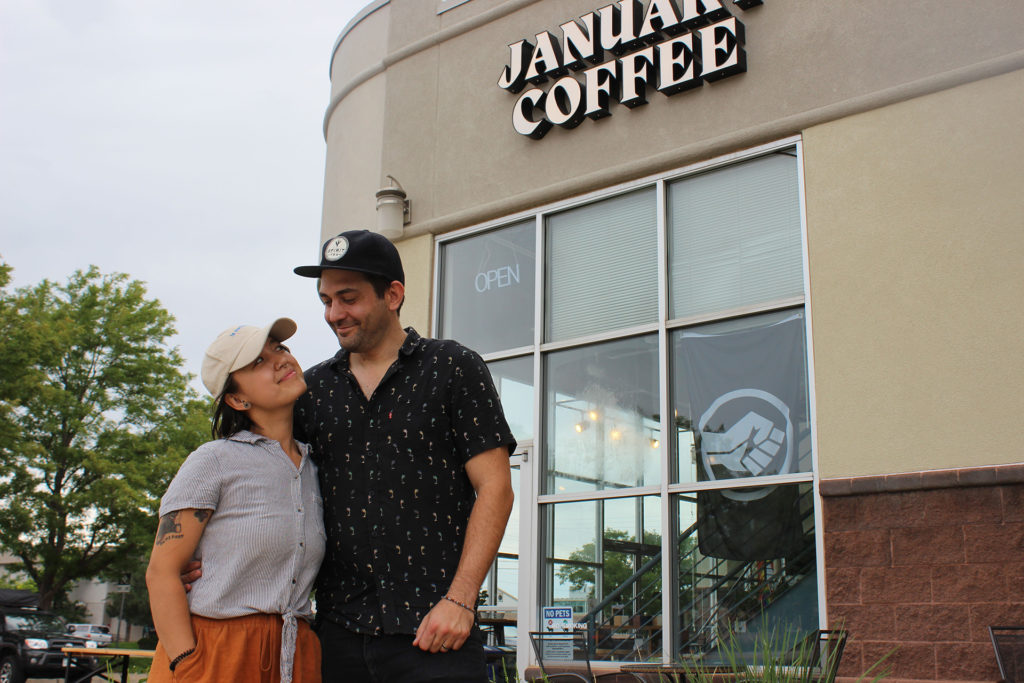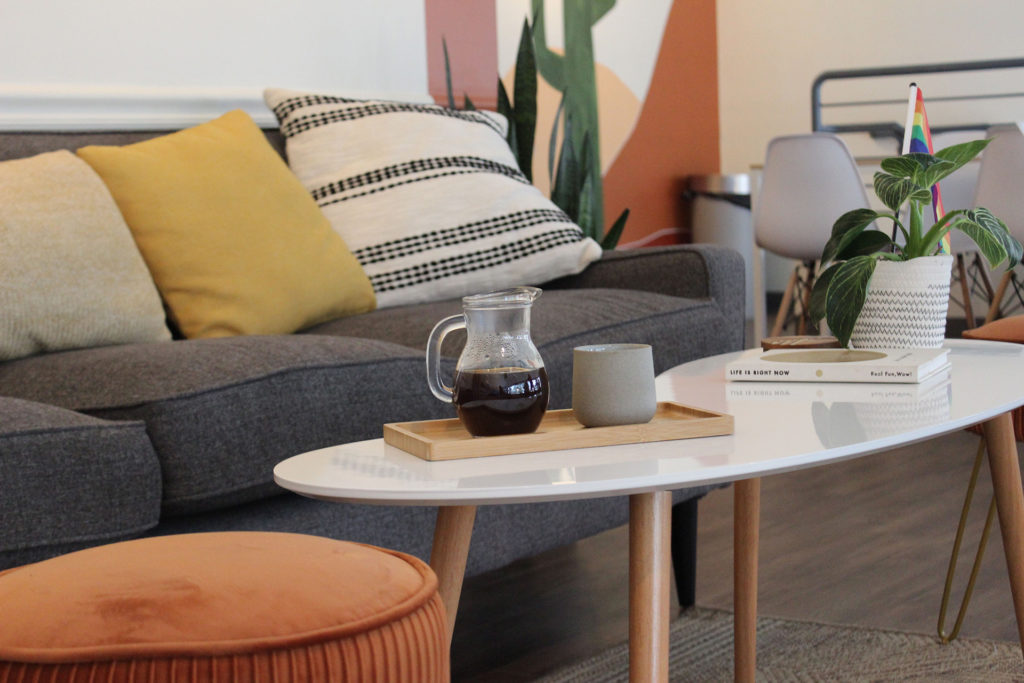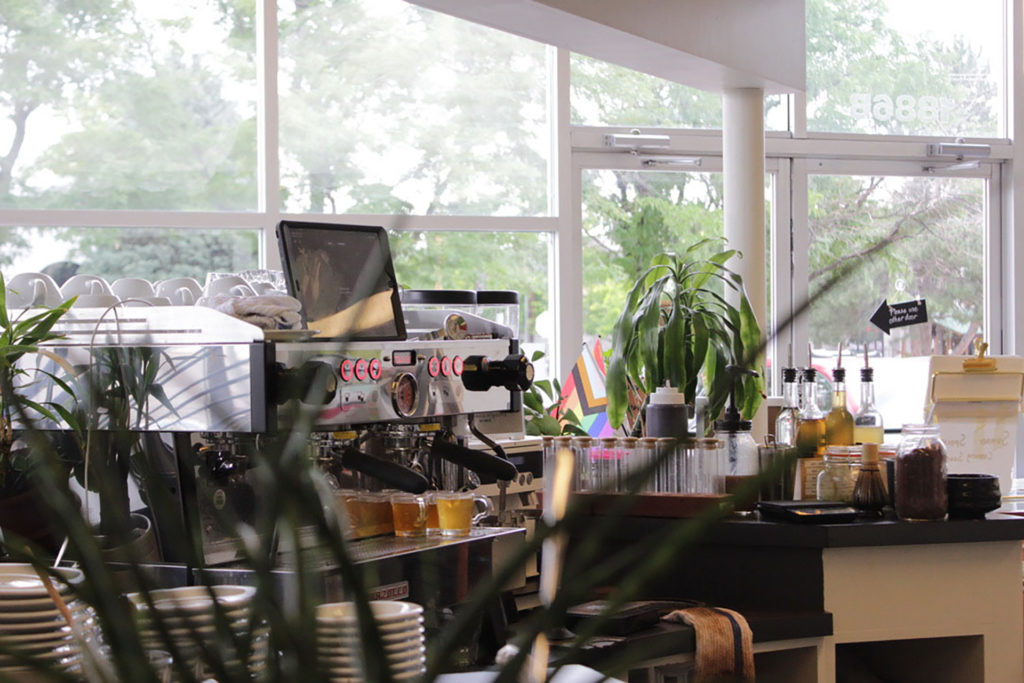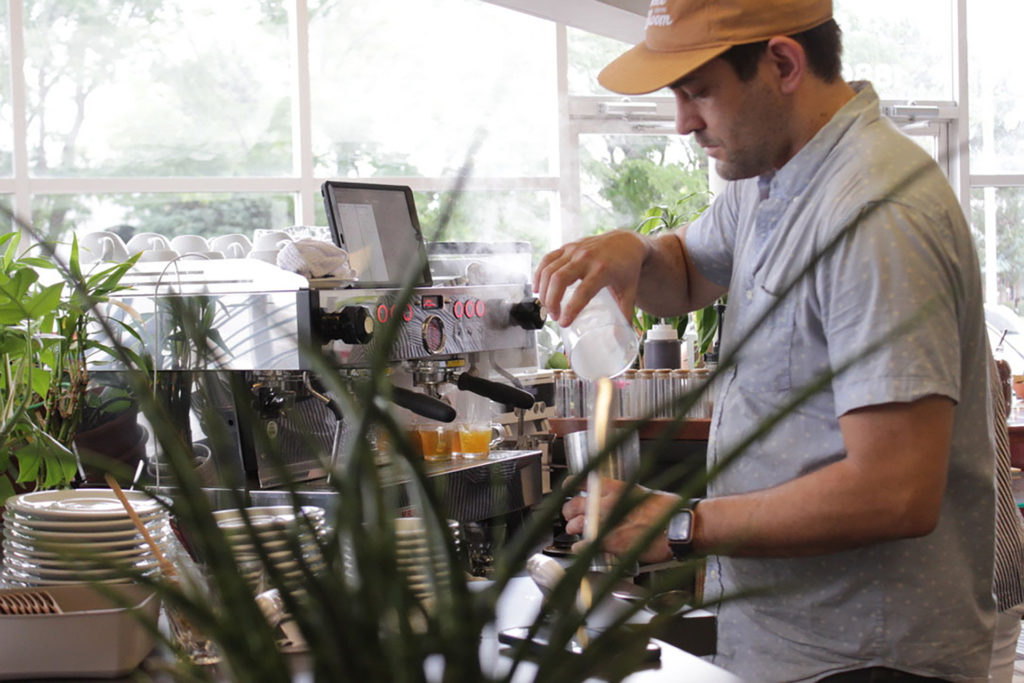January Coffee sits on the prow of a strip mall in Boulder, Colorado. Next door is a hair salon, a Michael’s, a Petsmart, a Walgreens; the Flatirons reflect off its window glass the same way they do for so many storefronts in the city of 108,000. But inside is something kind of weird. Or someone; really, it’s two someones: Kristi Persinger and John Imig.
For Persinger and Imig, January the month is as important as January the cafe. They met in January (2017), started dating in January (2018), moved to Colorado together in January (2020), and formed what would be the idea for January (the cafe) in January (2021).

In Boulder, small businesses live and die on their ability to cater to students and outdoor recreators. Besides the outsized student population, which swells in the autumn and spring, there are twice as many sporting goods and gyms here per capita than in anyplace else in the country. 18–35-year-olds stalk the medians of parking lots in plush running sneakers, darting between the doors of fitness studios and immaculate 4×4 SUVs, which crawl up every thoroughfare into the mountains.
January’s success here is predicated on neither of these things. Instead, the cafe is built on Persinger and Imig’s decades of experience working for specialty shops up and down the west coast, from Intelligentsia to Stumptown Coffee Roasters and many in-between.
“Working as a woman of color in coffee, I haven’t always necessarily felt that my work environments have been that way,” Persinger says. “So we have an internal goal to make this shop the best place that people have ever worked. We can try to make it a little bit better for ourselves, you know?”
“We wanted to create an environment that’s inclusive and equitable,” Persinger says. “Where everybody’s ideas are heard and there’s an openness to share.” Which, in January’s case, results in a graceful work environment where pressure is diffuse and everyone, regardless of background, is given the support they need and is paid and recognized for their role in making the cafe work, and a cafe where every customer is served the same great coffee without pretense.

“Working as a woman of color in coffee, I haven’t always necessarily felt that my work environments have been that way,” Persinger says. “So we have an internal goal to make this shop the best place that people have ever worked. We can try to make it a little bit better for ourselves, you know?”
Part of the way they do that is by encouraging a culture of openness and honesty.
“I don’t want people to feel embarrassed about sharing that they’re having a particularly bad day,” Persinger says. “I want to be understanding of that, because we’re all human, and the thing that we try to do is just lead with empathy in all that we do, and that makes just such a big difference in how everybody interacts here. And then our staff are all stoked to be here and really proud of where they work.”

Imig adds: “We’re open about our mental health with our staff and, and when they’re open with us about theirs, we can be supportive.”
Another part is by paying January employees a living wage. “Because we’re a new shop,” Persinger says, “we didn’t have a fully fleshed out budget in the beginning, but we knew that we wanted to pay everybody more than the current minimum wage.” In Colorado, that number is $9.54 for tipped employees as of this writing. “And we just kind of landed on a number that we thought we could afford to start, which right now is $13.”
“We started everybody at the same exact wage,” Imig says. Regardless of experience, their philosophy is that everyone at a shop “pulls their weight equally. Every job in the cafe is important and just as hard as another.” Just because one person’s a trained barista doesn’t mean that their colleague on register is doing any less. It also means tips are pooled and distributed evenly across employees.
And thought they haven’t fully figured out what their wage structure will look like in the future, beyond their current team of 11, which is up from just the two of them on opening day back in May of 2022. Eventually, if January continues to grow and expand to new shops, Persinger says they “want to think about how we can provide equity to people who are in it for the long haul.” The reasoning is that if employees of businesses are expected to take ownership over the success of their shop, they ought to have actual ownership over some part of it too.
As a very young, independently-owned and funded cafe, January’s able to offer living wages in large part because of how hard Persinger and Imig both work. After funding the cafe on their own, not taking salaries during January’s first three months, and each holding down a second job, they now work a comfortable, combined 160-hour work week. Today they pay themselves barista wages and walk around with bags under their eyes and dad hats to shield them from the high-elevation sun.
“We were trying to give as much to the shop as we possibly could,” Persinger says of the first few months. “In order to allow it to function and make enough money to be able to pay our staff well enough and, you know, afford to operate.”

In addition to being a great place to work, January is a great cafe. Because for however good Persinger and Imig try to be as owners, they are also absolute dorks when it comes to coffee. Just huge honkin’ coffee nerds.
January’s a multi-roaster that brings in coffee from across the country—they always carry Onyx, and have featured roasters like San Francisco’s Ritual, Dune out of Santa Barbara, and Mother Tongue from Oakland. They operate in the Australian model, offering a full-service menu of homemade food that’s all great—they make almost everything in-house, from breakfast burritos to the vanilla that goes into their drinks.
“We love great coffee, we love amazing food,” Persinger says. “And we wanted to be able to have both of those things in our shop. Because I feel like it’s just a more holistic experience when you can have an awesome breakfast burrito, that’s like the best you’ve maybe ever had, and great coffee.”
Then, she gets a bit conspiratorial, lowering her voice. “The craziest part is that we are a headless ventless kitchen,” she says. “So we can’t cook anything on a stove.”
Imig seems to nod. “We have to do everything in ovens.”
“So that was the thing that makes this so difficult,” Kristi says. “It’s sort of literal insanity.”

And while it’s true that making a full food program work with only an oven and a panini press is a kind of insanity, it can’t really be said that that’s the thing that makes January so difficult. Sure, having to scramble eggs in an oven is inconvenient and hard, but from an outside perspective, what makes the project of January so difficult is everything. What Persinger and Imig are trying to do, and what they do by necessity, is just difficult. All of it. From opening their doors with two weeks of operating expenses in the bank to working a double before taking off to their second jobs—it’s all difficult.
“There are days when we want to give it all up,” Persinger says. “Because I’m so tired, and I can’t do this anymore. And then some days where I’m so incredibly grateful for what we’ve created and seeing our literal dream come to fruition. It doesn’t get any better.”
January Coffee is located at 1886 30th St Suite B, Boulder. Visit their official website and follow them on Facebook and Instagram.
Michael Light is a freelance journalist based in Seattle. Read more Michael Light on Sprudge. Photos by David Light.